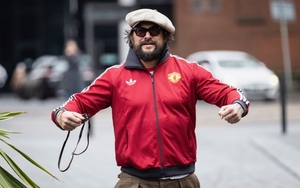WYTHENSHAWE-born ecologist Vincent Walsh started The Biospheric Foundation in 2010.
He had just completed his PhD at the University of Salford and wanted to continue work and research into ‘hyper-local food systems’ in the world outside university. In 2013 his enthusiasm came to the notice of Manchester International Festival who approached him about his research. They wanted to help fund his ideas, so he moved out of his nice flat in town and moved into a dilapidated building called Irwell House in Blackfriars, Salford.
"There are two kinds of environmentalist - those who see the city as an ecological biosphere and those that don't"
Walsh gave each floor of an old factory a distinct way of contributing to the scheme. Alongside growing produce, a whole food shop was opened to sell the crops to the surrounding community on the ground floor of one of the nearby flats. It didn't work out. A clearly troubled Walsh says, "Changing behaviours was hard and to this day I feel I didn't manage to do enough to engage people." Maybe a top down approach of telling people what is good for them is never the right way to approach things.
Now in 2015, with a slight re-brand The Biospheric Studio has a new improved five-year plan to deliver 50 ‘hyper-local inter-connected food systems’ across the North-west. Five projects have already been established in the first year and the project is looking for help from technicians, architects and ecologists. The idea is to help share and achieve Walsh's vision that the city and its technology is all part of the biospheric process.
The Biospheric Studio promotes more research around urban farming. It challenges the idea that urban farming consists of growing food on an allotment or in raised beds. One of the first projects will be at Manchester Museum, converting the top floor into a farm using the aquaponic system. So for instance inside Irwell House there are 600 fish tanks, the waste the fish create is circulated around the building to feed the plants.
The project at Manchester Museum isn't about the yields of crops produced, the focus is demonstrating what can be done within a building. It's about showing the real potential of an urban farm in a public space.
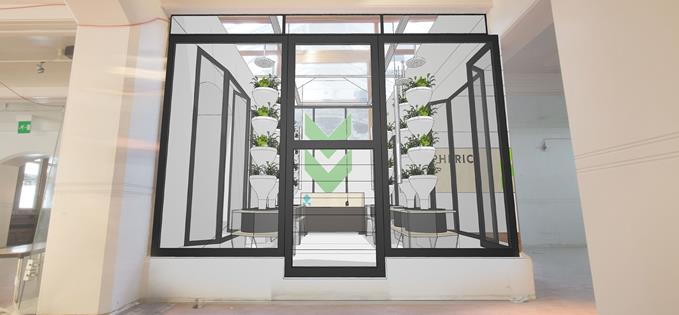 How the aquaponics system will look in Manchester Museum
How the aquaponics system will look in Manchester MuseumAnother project is running alongside the Manchester Food & Drink Festival from 10 September. A mushroom farm housed in a steel container will be dropped into Albert Square, allowing people to buy mushrooms and attend child friendly workshops.
There is also a Bio Historic Banquet planned by Chef Robert Owen Brown. This ties in with one of the other projects which sees mushrooms grown in shipping containers around the region - similar to the Festival in Albert Square. These will be sold to Manchester restaurants such as Tampopo and the River Restaurant at The Lowry Hotel, which presently pay around £15 per kilo for their imported mushrooms.
The project will sell their mushrooms for £21 per kilo, it’s a leap in price but restaurants are willing to pay as the ecological benefits outweigh the higher price. He says: "When you produce what supermarkets have that's when you lose all appeal, any restaurant could buy that kind of produce. This is grown in a good way. I'm not trying to put supermarkets out of the game but I am asking people just to experiment and encourage healthy, local, organic food. The best restaurants want the best products as they will be superior to any you can buy from the supermarket.”
The project has five restaurants signed up already. The restaurants will pay for the infrastructure of the urban farms across the North West not for the yield they produce.
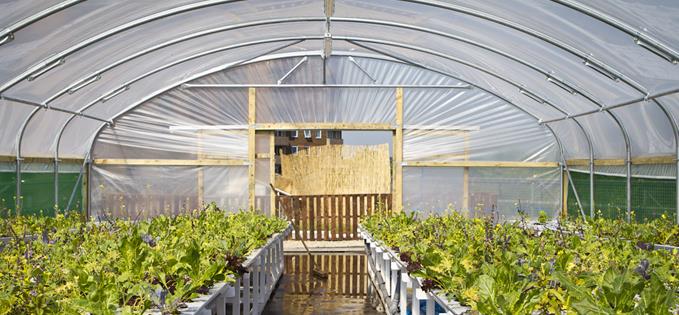 The projects roof garden. The first of many?
The projects roof garden. The first of many?In Pendleton there will be a moveable minimarket to replace the whole food shop selling organic produce to the community. By travelling around the community the opportunity to buy organic locally grown whole foods is increased. Sales will be monitored to see where shop would be best placed permanently.
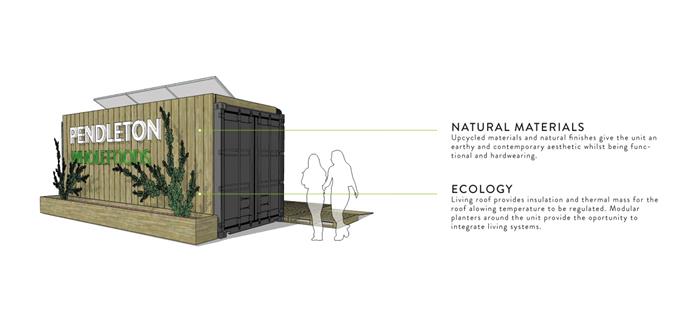 The community focused Pendleton wholefoods project.
The community focused Pendleton wholefoods project.
Even network rail are getting involved. It’s promising that a national company is taking interest in local evolution, aiming to make a living, green Oxford Road Station. Vincent hopes creating one great green infrastructure will see them being rolled out across the country. He says: "Nowhere else in the UK is thinking this way about food. Manchester can lead the way. We need to change how we view the biosphere. We are not above it, we are not below it, we are it."
The entrepreneur has raised £750,000 to stretch across the 50 urban farms and the other outlined projects. The challenge will now be to persuade enough people to buy into urban farming as part of their way of life. Whilst it sounds appealing will the majority of people have the time and money to get involved?
If not, then this could end up an expensive vanity project, an exercise in fantasy thinking. It could even be an example of green arm-twisting, something we're supposed to commit to because it sounds the right thing to do. After all the record isn't too good at present for Walsh. Amid all the 'positivity' the fact that when his Biospheric Foundation tried to open its shop nobody was buying and it soon closed, reveals the work needed to get pioneering projects of the ground. We tend to remember the things that work. Will this one?
The jury's still well and truly out.
To offer your services or find out more about the project contact Vincent Walsh here or on twitter @BF_UK_CIC.
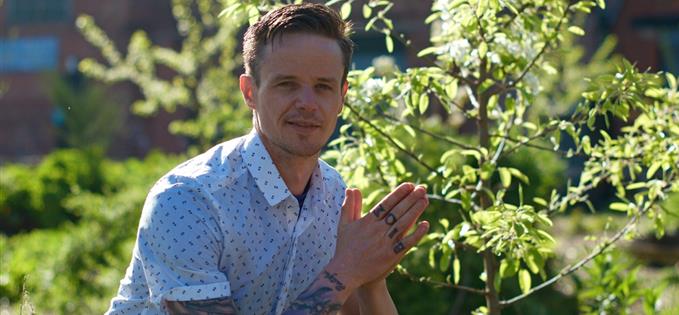
You can follow Kelly Degnen on twitter here @KellDeggers.











